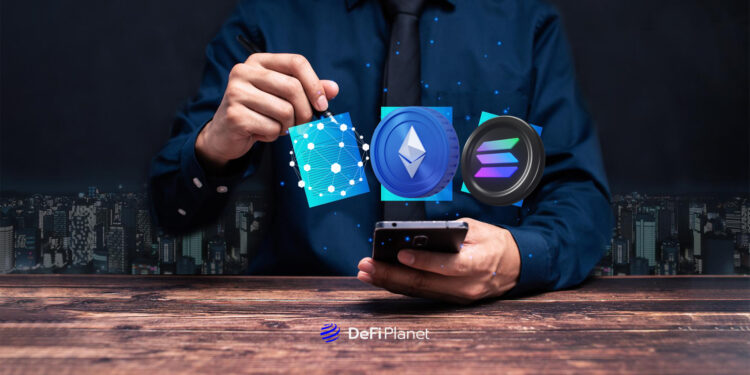Last updated on August 26th, 2025 at 09:51 am
Smart contracts have completely transformed the digital world, offering a way to automate agreements, increase transparency, and eliminate the need for intermediaries.
First introduced by Ethereum, these self-executing contracts have become a game-changer, not just for Ethereum, but for other blockchains like Solana, Binance Smart Chain (BSC), and Polkadot. Each of these networks brings its own unique features to the table, making them stand out in different ways.
In this article, we’ll examine what smart contracts are, comparing how they function across Ethereum, Solana, and other major blockchains. We’ll explore key factors like programming languages, scalability, security, speed, interoperability, and the level of support for developers, giving you a comprehensive view of these platforms.
Introduction to Smart Contracts
Smart contracts are a groundbreaking innovation in digital agreements, seamlessly combining code and contractual terms to create self-executing arrangements. These contracts reside on a blockchain and automatically perform specified actions when predetermined conditions are met.
This automation eliminates the need for intermediaries, ensuring faster transactions and reducing operational costs. Furthermore, the immutable nature of blockchain technology enhances transparency, as all terms and actions are verifiable by anyone with access to the ledger.
Another critical feature of smart contracts is their trustlessness; parties do not need to rely on each other or a third party to uphold the terms of the agreement. The code itself enforces compliance.
Typically, smart contracts operate on Layer 1 blockchains which provide the foundational infrastructure for their deployment and execution. Among the most notable Layer 1 blockchains that support smart contracts, Ethereum and Solana stand out, but they are not the only ones. Other significant platforms, such as BNB Smart Chain, Cardano, Cosmos, and NEAR, have also developed unique smart contract frameworks with distinct capabilities and trade-offs.
Ethereum Smart Contracts
Ethereum is widely recognized as the birthplace of smart contracts, offering a robust platform for developers to create decentralized applications. The backbone of Ethereum’s smart contract system is the Ethereum Virtual Machine (EVM), a runtime environment that isolates contracts from external systems, ensuring security and reliability.
Developers write these contracts using Solidity, a high-level programming language designed specifically for Ethereum, or Vyper, a Python-based alternative. Once the code is written, it is deployed to the Ethereum blockchain, where it becomes an immutable part of the network.
One defining aspect of Ethereum’s smart contracts is the use of gas fees. Each transaction or operation within a smart contract incurs a fee, paid in Ether (ETH), to compensate validators for the computational resources required. These fees fluctuate based on network activity, which can lead to high costs during periods of congestion. Despite this, Ethereum’s decentralized structure, supported by over one million validators, provides unmatched security and resilience.
The versatility of Ethereum’s smart contracts has fostered a diverse ecosystem that includes DeFi and NFTs.
Solana Smart Contracts
Solana offers a unique approach to smart contract functionality, emphasizing speed and cost-efficiency. Unlike Ethereum, which relies on Solidity, Solana’s smart contracts are written in Rust and C.
Rust’s modern design prioritizes performance and security, making it an excellent choice for developers building resource-intensive applications. However, Rust’s complexity can be a hurdle for newcomers, requiring a steeper learning curve than Ethereum’s Solidity.
The hallmark of Solana’s smart contracts is their remarkable throughput. Thanks to its innovative Proof of History (PoH) consensus mechanism, Solana can process over 2,600 transactions per second (TPS), far outpacing Ethereum’s base-layer capabilities. This high throughput is complemented by minimal transaction fees, making Solana particularly attractive for real-time applications like gaming and decentralized finance. The blockchain’s commitment to scaling is evident in its Firedancer upgrade, which aims to further enhance performance.
Solana’s speed and affordability have positioned it as a preferred platform for gaming and NFTs. Developers and users benefit from its ability to handle high volumes of transactions without compromising user experience. The blockchain’s innovation extends to mobile integration, exemplified by the Solana Seeker, a smartphone with a built-in wallet designed to simplify crypto interactions for everyday users.
Comparative Analysis: Ethereum vs. Solana Smart Contracts
1. Programming Languages
- Ethereum: Smart contracts are written in Solidity, a high-level programming language similar to JavaScript.
- Solana: Uses Rust and C to develop smart contracts, offering low-level control and better efficiency but a steeper learning curve compared to Solidity.
2. Execution Environment
- Ethereum: Utilizes the Ethereum Virtual Machine (EVM) to execute smart contract bytecode. EVM ensures compatibility across different Ethereum-based blockchains.
- Solana: Uses the Sealevel parallel execution engine, which allows multiple smart contracts to run simultaneously, significantly improving transaction throughput.
3. Transaction Speed & Scalability
- Ethereum: Can handle 15-30 transactions per second (TPS) in its current state due to its Proof-of-Stake consensus mechanism after the Ethereum 2.0 upgrade.
- Solana: Boasts a high throughput of 65,000 TPS, leveraging Proof-of-History (PoH) for efficient transaction validation.
4. State & Storage Model
- Ethereum:
- Smart contracts on Ethereum store both program logic and state (data) on-chain, making them more self-contained.
- Contracts manage their state internally, which increases computational overhead.
- Solana:
- Smart contracts (called programs) are stateless and store only logic on-chain. State data is maintained in separate accounts, enhancing efficiency and scalability.
- Separates program logic from state storage, allowing more efficient memory use and parallel processing.
5. Developer Experience
- Ethereum: Offers extensive documentation, a large developer community, and well-established tools like Remix, Hardhat, and Truffle.
- Solana: Has a growing developer ecosystem but requires knowledge of Rust or C, making it less beginner-friendly than Ethereum.
Smart Contracts on Other Blockchains
BNB Smart Chain also supports smart contracts and is compatible with the EVM, allowing Ethereum developers to migrate applications easily. It uses a proof-of-stake authority consensus model, which optimizes transaction speed and keeps fees relatively low. However, concerns over Binance’s legal issues and the degree of decentralization persist.
Cardano, another alternative, introduced smart contract capabilities through Plutus, its native scripting language. Unlike Ethereum and Solana, Cardano takes a research-driven approach, focusing on formal verification and gradual upgrades, making it more secure but slower in terms of adoption.

Cosmos has developed CosmWasm, a WebAssembly-based smart contract engine that supports multiple programming languages, including Rust and C++. It also offers Ethermint, an EVM-compatible module that allows Ethereum contracts to run within the Cosmos ecosystem. This modular and interoperable framework provides flexibility and high transaction speeds.
Similarly, NEAR Protocol simplifies smart contract development through its support for AssemblyScript, a language similar to JavaScript, making it developer-friendly. NEAR also employs sharding to enhance scalability and reduce transaction costs, ensuring efficient execution of dApps.
Each blockchain presents trade-offs, and developers must consider scalability, decentralization, security, and ecosystem support when selecting a platform for smart contract deployment.
READ MORE: The Race for Smart Contract Supremacy
Conclusion
Ethereum and Solana are among the most dominant platforms for smart contracts, but other Layer 1 blockchains offer unique advantages. Ethereum leads in developer adoption and security, while Solana provides unmatched speed and low transaction costs. BNB Smart Chain is widely used for DeFi and gaming due to its affordability and ease of use.
Cardano, though slower in adoption, offers an energy-efficient and research-driven approach to smart contracts. Cosmos and NEAR provide modular and highly scalable smart contract solutions, catering to interoperability and ease of development.
Ultimately, the choice of a Layer 1 blockchain for smart contract development depends on specific project needs—whether it’s security, scalability, interoperability, or low-cost execution. As blockchain technology evolves, these platforms will continue to innovate, further expanding the possibilities for decentralized applications.
The choice of blockchain depends on specific project requirements, whether it’s Ethereum’s robust infrastructure, Solana’s performance-driven ecosystem, or specialized platforms like BSC and Polkadot. Together, these blockchains contribute to a diverse and dynamic decentralized future.
Disclaimer: This piece is intended solely for informational purposes and should not be considered trading or investment advice. Nothing herein should be construed as financial, legal, or tax advice. Trading or investing in cryptocurrencies carries a considerable risk of financial loss. Always conduct due diligence.
If you would like to read more articles like this, visit DeFi Planet and follow us on Twitter, LinkedIn, Facebook, Instagram, and CoinMarketCap Community.
Take control of your crypto portfolio with MARKETS PRO, DeFi Planet’s suite of analytics tools.”





















